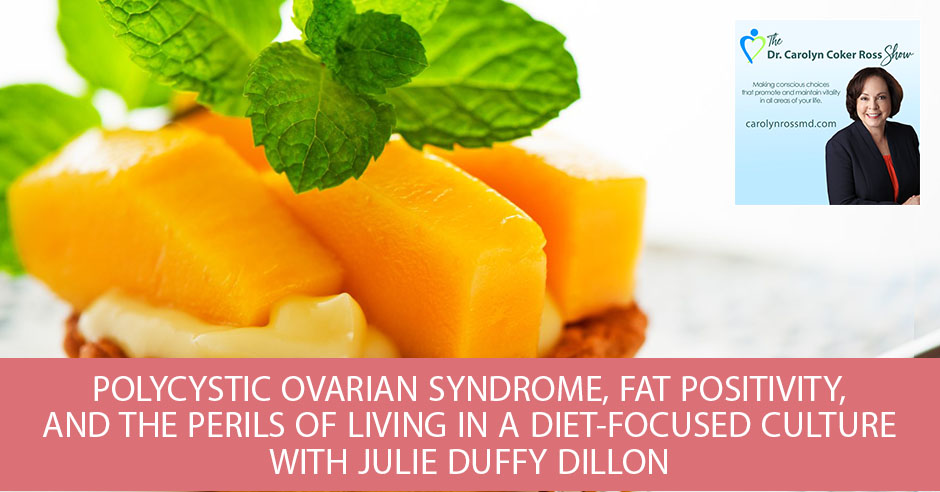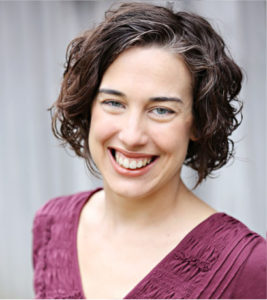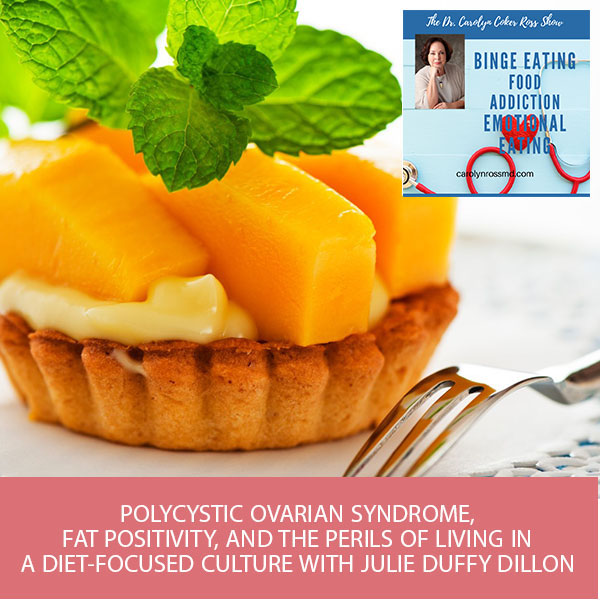
—
Listen to the podcast here:
Polycystic Ovarian Syndrome, Fat Positivity, And The Perils Of Living In A Diet-Focused Culture with Julie Duffy Dillon
PCOS And The Food Peace Journey
My special guest is Julie Duffy Dillon. Julie Duffy Dillon is a fat positive dietician, eating disorder specialist and food behavior expert. She partners with people along their food peace journey. Julie owns a group nutrition practice in central North Carolina using only weight inclusive and attuned eating approaches. She has her own podcast, which I was on called Love Food. It’s a Dear Abby show for those with eating concerns hoping to rewrite their fate. Listeners pen a letter to food outlining their complicated relationship. Julie and sometimes a guest discuss solutions before food writes back. Julie began specializing in treating Polycystic Ovarian Syndrome in 2005 after noticing the connection with weight bias and eating disorders. She speaks nationally on PCOS, eating disorders, food behavior, and ways to be a better dietitian. She was the featured expert dietician on TLC’s documentary, My Big Fat Fabulous Life. You can learn more about PCOS and Food Peace course at PCOSAndFoodPeace.com. Welcome to the show, Julie.
Thank you, Carolyn. It’s great to chat with you. I’m excited to have this discussion.
I want to start by asking you a little bit about why you describe yourself as fat positive and what does that mean?
First of all, my description of how I provide services is always evolving and the fat positive part of the description probably was in the last few years. As a dietitian, I’m totally conventionally traditionally trained as a dietitian to help people using a medical model that was more focused on weight loss to promote health. I describe myself as a weight inclusive provider. That’s happened because over time I found, “Diets don’t work for these clients I’m working with. They don’t work for most people.” It seems they promote harm and that feeling of chaos around food and the weight loss pursuit seems to be the foundation of that. What I found is that my clients who were moving away from diets, it was hard for them to find comprehensive medical care even outside of healthcare, but dignified care in their jobs and their relationships. Many people wanted to health troll them and push them to continue to lose weight because they thought that was best for them.
Fat positive, what it basically means to people I’m working with that I have a relationship with and I’m working with on their Food Peace journey is I accept you as you are now no matter what and tomorrow as well. I want you to feel at home in your own skin. That’s the primary thing that I see as the part of working together. I don’t think you need to be fixed, I think the world does. I also have found it to be something that is uncomfortable to say in front of other dietitians. I usually get either confusion when I say I’m a fat positive dietician or they don’t get it. They think I’m into that crazy diet keto or something like I’m into eating a lot of fat. It’s also a nice conversation starter in that way.
I hear from my patients that they’ve had a lot of problems working with dietitians often because of that male model focus on losing weight and that’s the same complaint that people get about doctors. They go into the doctor for a sore throat and the conversation always turns to weight. I speak as you do around the country and people have come up to me and said, “I really agree with your approach and I believe that it’s not a moral failing or people shouldn’t be stigmatized about their weight. I have this coworker and I’m concerned about her health. I want to be able to help her lose weight so she can be healthy.” It is common and it has been happening more and more frequently that there’s this disconnect when people say they understand that weight stigma is not good. They still want people to lose weight and not understanding that you interfering in someone else’s life in that way is stigmatizing.
It’s great that the weight stigma conversation is coming to light and it’s becoming more popular. When I think about Instagram, it’s probably a hashtag now that we see often enough. I don’t think it’s gotten deep enough yet and it’s because, for the most part, the majority of us are still tangling up weight and health. Also, not honoring that when someone is living in a body that’s larger than considered acceptable for whether it’s health or whatever, they do experience fewer options. That part of the conversation including privilege is an uncomfortable one. I know when I talk to other dietitians who are not weight-inclusive. That’s one thing that I go around the country speaking to dietitians who aren’t necessarily identifying as fat positive or most of them are not to bring that message.

Polycystic Ovarian Syndrome: People tend to health troll others and push them to continue to lose weight just because they thought that was best for them.
What I appreciate is there’s a lot of that cognitive dissonance, that stress and that tension of like, “I shouldn’t be keeping people from living their life, but I want them to lose weight.” The deeper part is that we have to acknowledge that when we’re in a smaller body, we have more options. It has to give up some of those options and to be in a place where we have to sit with that discomfort. Also looking at the research that I know for me, I was ashamed for a long time and I still can connect with that shame of like, “I did some damage to people because I believed weight loss helped, but I wasn’t helping.” I had to be okay with, “I was wrong,” and more of us have to say that in order for it to change.
I went through the same evolution as well because as a medical doctor, it hammered into me and still at conferences you could hear that. At a UCSD Conference, some people were talking about cancer risk and obesity. I raised my hand to ask a question, “Have you ever considered the new information that perhaps it’s not weight that is the relationship with cancer, but it’s other lifestyle factors or whatever.” I was shot down that they still 100% believe the number on the scale. I understand because that’s how we were trained and I have felt regret that I hadn’t discovered this sooner. I know that in working with my patients, what I kept seeing over and over was people being unhappy and losing weight and gaining weight. That’s what prompted me to shift my perspective to body acceptance, body neutrality. It was my patients who I have to thank for that. I have a lot of regrets that wasn’t something I knew before, but it’s an evolving situation where the research is not guiding us. It’s holding us back in some ways.
Especially because the research has its own fatphobia laced in there. It’s loud and I see it for sure. I want to say too about how your patients over time have helped you to connect with this approach. That’s exactly the same for me as well. We have a lot in common. I feel lucky over the last many years for my clients to have taught me this. I had such a privileged sitting in that chair opposite of a client who’s struggling and to be able to see that perspective and the big picture. They helped me to connect the dots. I can only hope that we can help more providers to see it that way and then also people themselves too.
The provider side is where I’ve been more focused of late in all of the talks that I give talking about weight stigma. Even talking about my own understanding of weight and health and how that’s changed and how much damage we do as healthcare providers constantly focusing on that number on the scale. It’s important to talk a little bit more about how weight stigma is associated with eating disorders. What have you seen in your practice?
What I see a lot of is people trying really hard to follow either doctor’s orders or society’s orders or diet culture’s demands. They’re trying hard and not being believed that they’re trying hard. What ends up happening is that then people try harder. A person walking the Earth in a body that’s larger than considered acceptable and not dieting is a radical act, which can be exhausting. In order to have more ease in the world, people want to fit in. They want to be accepted. They want to walk into a restaurant and have a seat that fits their body. People try harder and harder. I know for me, I didn’t always believe my clients when they told me that they were eating certain amounts. I almost said restricting but I know that’s not necessarily how other people would call it. People would say like, “I’m only eating X, Y, Z amount of calories and I’m exercising this amount.”
Especially in my clients with Polycystic Ovarian Syndrome, I would hear many people cutting out so much but then their weight wouldn’t go down or it would go up. They would try harder and harder. What eventually would happen to many is that they would try so hard that I’m like, “If I didn’t know your height and weight, I would have diagnosed you with anorexia nervosa years ago.” What’s going on? Why is someone at a higher weight body starving themselves? Why would we call that good when we call that pathological in someone with a lower weight? That struck me after seeing many people. Maybe ten or twenty people are lying about what they’re eating, but hundreds? How can that be? Maybe it’s the methods that are not working, not the person who’s dieting and trying. It’s pure torture that we expect people to do.
[bctt tweet=”Recognizing that diets don’t work is really about becoming aware of the importance of respecting your body.” username=”CarolynCRossMD”]I haven’t spent my life dieting, but I have dieted in the past and I find it grueling. I would imagine doing that over and over. It’s soul-depleting in a way. Depriving yourself of nourishment is soul-depleting.
We’ve seen that in research. I always love talking about probably the same research study that you bring up, the Minnesota Starvation Experiment from the ‘40s. They call it semi-starvation but it was not that low amount of calories when you consider today’s standards. It was 1,500 calories and that amount for some people is like, “That’s way more than I need.” I’m like, “What are you talking about?” These men who were physically and psychologically considered to be healthy were in the throes of depression and some are hallucinating cutting off fingers or something.
They were bingeing. They weren’t watching food shows because they didn’t have that then but they were reading books and obsessing about food.
When I first read that study and learned about it, I’m like, “That sounds exactly like my clients with anorexia or bulimia.” The body doesn’t know why a person diets. It reacts however it’s going to react, which is how we’re wired to survive. That’s why weight stigma connects to eating disorders and not everyone who diets has an eating disorder, but I haven’t met anyone yet with an eating disorder who didn’t diet.
That’s the best way to put it. Everyone with an eating disorder has dieted. Let’s shift and talk about something that we don’t hear a lot about. I by chance started watching My Big Fat Fabulous Life. I’ve watched the episode where she was seeing the fertility doctor and trying to decide what to do about her desire to have children. She mentioned the PCOS, the Polycystic Ovarian Syndrome. I understand you were a featured expert dietitian on the show. Let’s start by talking a little bit about what is PCOS and how you got interested in working with people with that.
PCOS is also called Polycystic Ovarian Syndrome. It’s an endocrine disorder that has metabolic and reproductive consequences to it. It’s because of the word ovaries in it that everyone thinks it has to do with ovaries. The episode you’re describing with Whitney going to the doctor and curious about her fertility. Most people, whether they’re in healthcare or not, think about PCOS just being about ovaries. It has many more implications and consequences to it besides wonky ovulation. It also has these metabolic consequences that end up making a person with the condition to feel exhausted, to have cravings that are intense, especially to carbohydrates. It comes from these high-circulating insulin levels and this pro-inflammatory state that ends up being chronic for people with PCOS because of this hormonal dysregulation.
What many people with PCOS end up experiencing is because of the high insulin levels and their bodies not using food for energy, a lot of them end up having a larger body especially a larger stomach. When that person goes to the doctor and she’s like, “I’m not ovulating. I feel awful.” The dieting is the recommendation, especially once they’re diagnosed with PCOS. Something about Whitney Thore, the main person on that show, My Big Fat Fabulous Life. She told us in her story that when she went to college, she left home for the first time and she gained 100 pounds her freshman year in college. I call it a myth. It’s not true that Freshman Fifteen thing, but when people experience 100-pound weight gain, which is not something that a person can do with calories in, calories out thing. There’s something metabolic going on. She also has disclosed to her eating disorder history way more than she thought she should. That’s always been something that she was mindful of. She was always careful.

Polycystic Ovarian Syndrome: Walking the earth in a body that’s larger than considered acceptable is a really radical act which can be exhausting.
The big shift in weight changes is a common part, especially in the early twenties. I was already an eating disorder specialist. I didn’t want to specialize in anything medical ever again. I was like, “I want to specialize in food behavior,” and I had finished a Master’s Degree in Mental Health Counseling and I was like, “I love behavior, talking about behavior and the entire nuance,” but I kept having all these clients with PCOS come in especially as I moved through a more weight neutral approach. I was like, “I’m not going to put you on a diet because those don’t work anyway.” When I looked through my training as a dietician, we get this big thick book called the Krause Medical Nutrition Therapy book. Any dietitian knows what I’m talking about. It’s four inches thick. I remember my first client with PCOS looking through it furiously, which you never want your dietitian or healthcare provider to look at a book in front of you.
Before I had Google on my phone, they had the paragraph that I had from Krause said basically put them on a diet, treat like prediabetes. I’m like, “That’s not going to work because diets don’t work.” It took me several years to find people who have gone before me to find other ways to treat it. Basically, moving away from diets helps the inflammation go down and treating insulin levels that are high instead of cutting out carbs, which they’re told to do which is pure torture. Finding ways to lower insulin makes then the body not have as much of a craving for carbohydrates. The body ends up managing the condition on its own. Focus instead of how a person presents in their size instead like, “Let’s focus on health and help you feel better and what feels better for you.” I’ve seen people’s ovulation turn normal. They have a bunch of kids. People have the energy to move their body if they want to. Before in that weight cycle stuff, that never happened.
Dieting doesn’t give you energy. What are the things that you’re doing with your clients with PCOS besides not putting them on a diet?
There are many things. I have a twelve-step process that I take them through and a lot of it is healing from the wounds of diet culture and making sure a person’s eating enough. That 1,500-calorie thing, many people think they have to eat so little amounts of food. That causes the insulin levels to go high too. In the long-term, that does not help so I make sure they’re eating enough, a basic amount because I don’t know exactly how much they need. I try to get them closer to it. There are supplements, medications, working with their doctor. We can help them to find that helps to lower insulin levels. One, in particular, that’s exciting is inositol. Inositol is a B vitamin that’s considered a secondary messenger that helps insulin work well. Those of us without PCOS, whenever the insulin is not able to open the door to the cell for energy, it seems to be that the inositols are like WD-40 and they go in there and help the door open better.
Inositol also helps with depression.
That’s the thing about it. The people with PCOS, they’re thinking there’s either a defect or a deficiency with these inositols. We have nine in total, but there are two, in particular, they’ve connected to it. My clients with PCOS because of these high circulating insulin levels, what they’re finding is it’s promoting that depression, intense anxiety I see with my clients with PCOS too and inositol by bringing down insulin. They’re funding research that helps with depression, anxiety. It helps with cholesterol, testosterone, ovulation, many amazing things. Once my clients start using that they’re like, “I don’t feel I need to call myself a food addict anymore. I feel more at ease with food,” and then their body tells them what they need. They don’t have to do a diet. They’re like, “I sleep better now. This is great.”
[bctt tweet=”It’s the world, not the body that needs to be fixed.” username=”CarolynCRossMD”]It’s amazing when you get some sleep and you eat normally how much better you feel.
75% of people with PCOS experience sleep disorder like sleep apnea. There are different sleep disorders that they’re experiencing, but that further promotes that higher insulin level as well and that inflammatory state. Basically, helping with ways to lower insulin and then when a person’s insulin levels are an advantage, then they usually find that they’re craving movement in some way. That can take a while because it depends how long they’ve been affected by diets. When they find movement, I want to help them to connect with something that feels good to them. Finding ways to manage stress because managing this chronic condition is super stressful so finding ways for them that help manages stress levels.
PCOS sounds like a great model for treating any of the food and energy depletion issues in terms of recognizing that. I think about all of the diets who put people on diet pills and so on. Probably in 50 years, people look back on that as being in the dark ages when in fact we don’t understand what affects our appetite. We don’t understand what affects our sleep. All of these things, I have a more holistic approach like you. I’m finding that there are many aspects to the issue of eating disorders in particular with people living in larger bodies that we don’t know anything about in medicine. We can’t say that we know how to help people because in most cases we don’t. If we can take the focus off of size and the number on the scale, there’s much more we can learn about metabolism and appetite and emotions and sleep.
If we focus less on the size, it helps us to see the person and that they do not necessarily need to be fixed. We need to help promote health. I also feel all the metabolism research that’s coming out, we don’t hear about much of it because it’s too scary. For many of us who are in the throes of fatphobia, it’s hard to appreciate. Dieting in the short-term, that does things like lower cholesterol and improve insulin but when we look twelve weeks out or two years out, it’s worse and not better. Even if people keep continuing the diet, there’s definitely research that’s showing that. It’s scary to admit it. Unfortunately, even people who are doing that research at times they’ll say, “We should still diet,” because it’s like, “Why do we have to keep doing that?”
It may take a law to say that we have to outlaw diets before we can figure out what’s going on in people’s metabolism. Just because you’re living in a larger body doesn’t mean you have to be fixed. What I want to be able to help my clients with is to feel better whatever body size they’re in, to feel better and to be able to do the things they want to do. To have more joy in their lives and to have more options for themselves, whatever that entails. After years of dieting and being stigmatized, people have given up. I see a lot of my patients who have given up and settled for what they have.
That’s what I want for people I work with too. Knowing they have so much more wisdom that’s innate within them that can help guide them there that for so long we’ve messed up on. That they can trust their hunger and they can trust meeting their needs however they can meet them.

Polycystic Ovarian Syndrome: If we focus less on the size, it helps us to see the person and realize that they don’t need to be fixed.
The body is the reservoir of all the wisdom you need to run your life. Can you give us a couple of steps that one needs to take to heal their relationship with food, how to avoid this new stigma called healthism where what we’ve been talking about?
It’s so much bigger than individuals, especially with weight and health having that twisted relationship. People are saying, “I’m better because I’m healthier or smaller.” It’s marginalization. It’s showing your privilege and not caring about a person. I also feel I believe in body autonomy and I wish more people did too, that my neighbor can do whatever they want with their body, I can do whatever I want with mine.
It’s amazing that people think that it’s their obligation or their responsibility to take care of someone else’s body. That shocks me. You could be a stranger in the store. I’ve had a woman who gave her child a cookie in the grocery store and a pure stranger came up to her and said, “You shouldn’t be giving your child cookie. She’s going to end up being as fat as you are.” I was like, “Someone said that in the store, a stranger?”
It has ties to deeper marginalization too. I’m reading some of the research behind how it has roots in white supremacy and how these are misogyny. These are other things that are bigger and it’s hard to acknowledge when someone’s health trolling like, “You’re trying to be the one who’s controlling everything and keeping the system running.” It’s big.
One last word on healthism, it’s yet another cover though for weight stigma. It’s another code word for weight stigma. You have to be careful about that. Let’s wrap it up with some positive things that people can do to begin to heal their relationship with food.
I feel a person’s relationship with food, I call it their Food Peace journey and it’s a journey. It’s not something like we diet and we’re like, “I’m peaceful with food now.” It’s something that we know we live in this environment that’s not recovering from its own eating disorder. I always want people to keep that in mind. Part of the starting of healing and going through this journey is acknowledging first that diets don’t work. That first step is respecting. We’re taught to disrespect our body by torturing ourselves with diets. The first step is acknowledging that I want to respect my body and try this new thing, even if it’s temporary because it can be hard to reject diets forever.
Even temporarily say, “I want to respect my body,” and that can turn into a lot of different things. There’s a lot of grief, loss and pain that comes from diets have harmed me. After the sadness that comes from that, I see a lot of my clients get angry. I always feel like a weirdo because I’m happy when they’re angry. That means to me that they’re onto the next layer, which is releasing. Especially those of us socialized as females, we’re taught to hold in our anger. When we put it out there as like, “Diet culture is this thing,” naming it and these are these big systems that are against us. Releasing that and feeling that anger, then that can open up space to do a lot before it robs you. How diets rob us of a part of our soul or they take something from us. Soul depleting is what it is.
[bctt tweet=”The smaller body has more options. It’s having to give up some of those options and be in a place where you have to sit with that discomfort.” username=”CarolynCRossMD”]Once we go to a place of rejecting diets and releasing that anger, then the repair work happens. That’s what I see as a third step where we can practice being compassionate and curious and have permission to do what we need to do. From there, my clients and I often find is where intuitive eating work starts to happen. Where we can help rewire some beliefs like false truths they may have had in their foundation and then start to reconnect to their body. Hearing hunger and fullness and what they need for pleasure and satisfaction. That, in a nutshell, is probably years and years of work for many people. That’s how I see it.
The work is not on the body. The work is the spirit, the emotions. It’s on the mind, on our thoughts. The opposite of dieting is the anti-diet because it’s not about focusing on the body per se. It’s about going into a deeper place is what I try to do with my clients is working on that deeper level. The body follows along and the body is our guide, but we don’t have to do something to the body. We don’t have to make it exercise. We don’t have to make it eat or not eat. It’s about going into that deeper component and then allowing the body to do what it does naturally.
I would love to add one more thing to that too because I feel we live in a world that’s all or nothing. I feel many people connect with, “Diets don’t work.” They love to see the end point of a lot of this work of eating when you’re hungry and stopping when you’re full and having that variety and craving vegetables. There’s a big old messy middle in there that can take a long time and people need permission to take that time. That’s a hard sell but also many people who do this type of work get frustrated that they’re not there yet so it’s not working for them. Anyone in our audience, I would say take your time. Find someone that can help support you like Carolyn and find a place.
I studied my first boards in preventive medicine, which is all about behavior change. In preventive medicine, the research shows that it takes three to five years to make a permanent behavior change. That’s why the diet thing is so much madness. It’s insanity to think that a 30-day program or a 60-day change in your eating will be permanent, when in fact it is three to five years. That’s the bad news but it’s also the good news. I know you see the same and I liked the fact that you added that because it is a long journey. It’s not an overnight fix.
You’re not doing it wrong if you’re not seeing it like, “Why am I not craving vegetables yet?”
It’s not your fault. That’s how long it takes. If you’re a smoker, it takes three to five years to sometimes even quit. If you have an addiction, it takes three to five years before you’re straight again. In our culture, everything is about the quick fix. Everything has to be done overnight. Where is the magic pill? I’m sure you like me have never found the magic pill. Julie, it’s been such a pleasure to talk with you on the show. I appreciate all your wisdom. If you’re not in the dietitian field, you may not know that Julie is the rock star of dietitians. When I was on your podcast, I was at a Christmas party and someone came up to me and said, “I heard you on Julie Duffy Dillon’s podcast and I listen to that every day. You were so lucky to be on her podcast.” It’s a pleasure. Thank you so much for all the work that you do.
Thank you, Carolyn, for inviting me on. I enjoyed it.
We’ll see you next time.
Important Links:
- Julie Duffy Dillon
- Love Food
- PCOSAndFoodPeace.com
- Krause Medical Nutrition Therapy
- Carolyn Coker Ross on Love Food podcast
About Julie Duffy Dillon
 Julie Duffy Dillon is a Fat Positive Dietitian, Eating Disorder Specialist, and Food Behavior Expert who partners with people along their Food Peace journey.
Julie Duffy Dillon is a Fat Positive Dietitian, Eating Disorder Specialist, and Food Behavior Expert who partners with people along their Food Peace journey.
She owns a group nutrition therapy private practice in central North Carolina using only weight inclusive and attuned eating approaches. She hosts the weekly podcast Love Food.
It is a Dear Abby show for those with eating concerns hoping to rewrite their fate. Listeners pen a letter to food outlining their complicated relationship. Julie and sometimes a guest discuss solutions before Food writes back. Julie began specializing in treating Polycystic Ovarian System in 2005 after noticing the connection with weight bias and eating disorders.
She sought training on the physiology and endocrinology from pioneering experts willing to not focus on weight loss and diets to treat the complicated condition. This insight has provided people with PCOS to advocate for their physical and emotional health without torturing themselves with diets.
She speaks nationally on PCOS, eating disorders, food behavior, and ways to be a better dietitian. She was the featured expert dietitian on TLC’s documentary My Big Fat Fabulous Life. Learn more about her PCOS and Food Peace course at PCOSandFoodPeace.com








